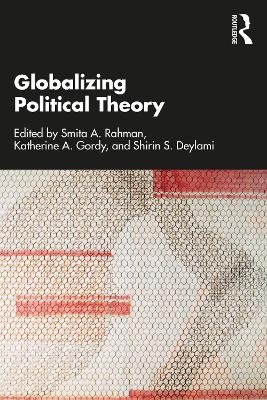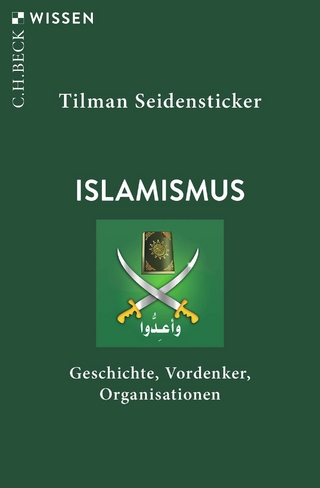
Globalizing Political Theory
Routledge (Verlag)
978-1-032-11826-0 (ISBN)
Globalizing Political Theory is guided by the need to understand political theory as deeply embedded in local networks of power, identity, and structure, and to examine how these networks converge and diverge with the global. With the help of this book, students of political theory no longer need to learn about ideas in a vacuum with little or no attention paid to how such ideas are responses to varying local political problems in different places, times, and contexts.
Key features include:
Central Conceptual Framework: Introducing readers to what it means to “globalize” political theory and to move beyond the traditional western canon and actively engage with a multiplicity of perspectives.
Organization: Focused on key topics essential for an introductory class aimed at both globalizing political theory and showing how political theory itself is a globalizing activity.
Themes: Colonialism and Empire; Gender and Sexuality; Religion and Secularism; Marxism, Socialism, and Globalization; Democracy and Protest; and Race, Ethnicity, and Indigeneity.
Pedagogy: Each chapter features theoretical concepts and definitions, political and historical context, key authors and biographical context, textual evidence and exegesis from the foundational texts in that thematic area, a list of discussion questions, and a list of resources for further reading.
Committed to a multiplicity of perspectives and an active engagement between the global and the local, Globalizing Political Theory connects directly with undergraduate and graduate-level courses in political theory, global political theory, and non-western political thought.
Smita A. Rahman is the Johnson Family University Professor of Political Science at DePauw University where she teaches courses in modern, contemporary, and Islamic political thought. Her research interests lie at the intersection of contemporary and comparative political theory. In particular, she is interested in exploring how foundational concepts in political theory rupture and become contested in a globalized world of difference. Katherine A. Gordy is a Professor of Political Science at San Francisco State University, where she teaches courses in political theory and Latin American Studies. Her specific research and teaching interests are comparative political theory (Latin American and Caribbean political thought), critical theory, and theories of history and ideology. Shirin S. Deylami is a Professor of Political Science and affiliate faculty in Women, Gender and Sexuality Studies at Western Washington University, where she teaches courses in contemporary political theory, feminist theory, and Islamic political thought. Her research interests are at the intersection of feminist theory and Islam with particular interest in the way debates about Muslim women’s identity and freedom affect Islamic and Western conceptions of self and other.
Introduction: What Does it Mean to Globalize Political Theory? Part 1: Colonialism and Empire 1. The Mentor and the Mentee: Competing Visions in Vietnamese Political Thought 2. From Black Liberation to Human Freedom: Claudia Jones, Frantz Fanon and Universal Emancipation 3. Life, Death and Futurity in the Work of Achille Mbembe Part 2: Gender and Sexuality 4. The Ayatollah Khomeini: Gender and Sexuality in the Fight against Westoxification 5. Towards an Afro-Latin American Feminism: Notes on Lélia Gonzalez’s Theorizations 6. Different Foundations for Islamic Feminisms: Comparing Genealogical and Textual Approaches in Ahmed and Parvez Part 3: Religion and Secularism 7. Sayyid Qutb and the Politics of Renewal 8. The Dialectical Utopianism of Ali Shariati 9. The Sikh and Ahmadiyya Communities: Finding Shared and Distinct Understandings of the Oneness of God through Religious Pluralism Part 4: Marxism, Socialism, and Globalization 10. Walter Rodney and Samir Amin: From Relations of Underdevelopment to Global Decolonization 11. Ernesto “Che” Guevara’s Political Economy: Balancing Productivity and Dis-Alienation 12. R. İhsan Eliaçık: Anti-Capitalist Islamic Thought in Turkey 13. Thomas Malthus and Global Malthusianism Part 5: Democracy and Protest 14. “Be Water, My Friend”: Protest, Identity Politics, and Democracy in Hong Kong 15. Fatima Meer’s Father: Storytelling-History, Racialized Men of Color and Feminism, and Overcoming the Precarity of Black-Asian Solidarity 16. Abdias do Nascimento: Quilombist Praxis Amidst the Genocide of Black People Part 6: Race, Ethnicity, and Indigeneity 17. Contesting Conquest: Titu Cusi Yupanqui’s Anticolonial Resistance 18. Haunani-Kay Trask, Ka Lāhui Hawai’i, and Indigenous Sovereignty 19. W.E.B Du Bois, the Negro Problem, and the Case against Black Involvement in War
| Erscheinungsdatum | 17.11.2022 |
|---|---|
| Verlagsort | London |
| Sprache | englisch |
| Maße | 152 x 229 mm |
| Gewicht | 400 g |
| Themenwelt | Sozialwissenschaften ► Ethnologie |
| Sozialwissenschaften ► Politik / Verwaltung ► Politische Theorie | |
| Sozialwissenschaften ► Soziologie | |
| ISBN-10 | 1-032-11826-1 / 1032118261 |
| ISBN-13 | 978-1-032-11826-0 / 9781032118260 |
| Zustand | Neuware |
| Haben Sie eine Frage zum Produkt? |
aus dem Bereich


